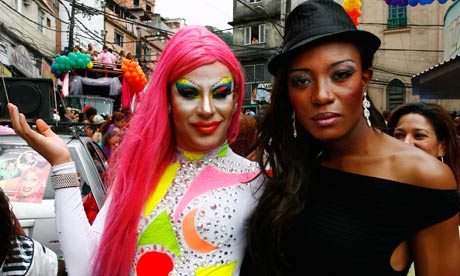
The theatre lights dim and a Brazilian supermodel takes to the stage, tanned legs emerging from a skintight miniskirt.
In the audience, an A to Z of Rio de Janeiro's great and good: pop stars, sports stars, soap stars and would-be stars, flanked by an army of local paparazzi. Clutching a microphone, the model addresses the crowd. "My name is Lea and I am a transsexual," she says, triggering a frenzy of applause and whistles.
The model in question is Lea T, Brazil's first transsexual supermodel. And this is the champagne-soaked launch party for Rio's inaugural diversity week – a celebration of the city's cultural and ethnic differences and an attempt to position Rio as the global capital of gay tourism.
"Rio is a city without prejudice," beams Eduardo Paes, the city's mayor, as he arrives at the event. "It is an open city that accepts everything with an open heart."
Recent months have seen an avalanche of new lesbian, gay, bisexual and transgender (LGBT)-friendly initiatives in Rio: vocational training courses for transvestites, anti-bullying projects aimed at gay and lesbian students and new legislation outlawing discrimination in the city's nightclubs.
In February the mayor announced the creation of a special diversity secretariat headed by Carlos Tufvesson, a gay, multilingual fashion designer.
Rio, says Tufvesson, is not only "the sexiest destination on Earth" but also a place where tolerance is natural. Just as the city staged important protests against the military dictatorship during the 1960s, Rio is again blazing a trail for civil rights, he believes.
The initiatives are also a potential moneyspinner. Last year, 25% of Rio's tourists, or around 880,000 people, were gay. The city's tourist board hopes to drive that number even higher and has published glossy, rainbow-coloured brochures packed with pictures of muscle-bound men and slogans urging tourists to "live the Rio sensation".
"Personally I think that anyone who wants to make money could open any kind of gay establishment in Rio because it is a dead cert return," says Tufvesson. "There is a big demand for this market still. Rio is now part of the gay calendar."
In 2007 Buenos Aires stole a march on Rio, opening what it claimed was Latin America's first luxury gay hotel.
But Rio is a "naturally" LGBT-friendly city, Tufvesson says, making "ghettoisation" unnecessary.
"Do we need to have gay restaurants? Gay food? Gay waiters? Here in Rio, my love, you can [kiss anywhere]. Otherwise we'll go there and close them down. Our municipal laws are strong."
Resistance to the government's progressive stance remains, predominantly among the religious right. Earlier this month, one Catholic MP attacked attempts to alter state legislation that would criminalise discrimination.
"Look, if we are all equal, with the same rights, I also have to have the right to not want a homosexual employee in my company," the MP said, before being forced to make a public retraction by fellow politicians.
Silas Malafaia, a prominent local evangelist, went a step further last year, erecting 600 advertising hoardings around Rio emblazoned with the phrase "In defence of the family and the preservation of the human race: God made men and women".
But activists' irritation at such actions is matched by praise for the government's increasingly vocal support for gay rights.
"It's really incredible that Brazil – a place that they call a third world country – is doing something that few first world countries have done," Lea T says back at the launch of Rio's diversity week, which has come weeks after the state government organised what it called "the largest gay wedding in the world".
At the reception local politicians and 43 ecstatic newlywed couples celebrated with a rendition of Frank Sinatra's Theme from New York, New York. The singer? Jane Di Castro, one of the city's best-known transvestites.

